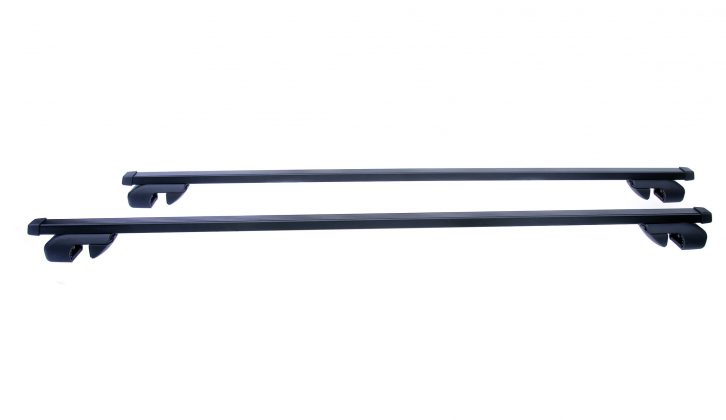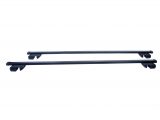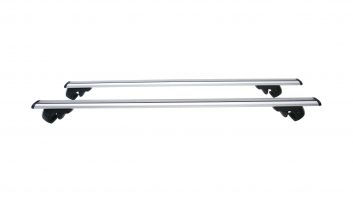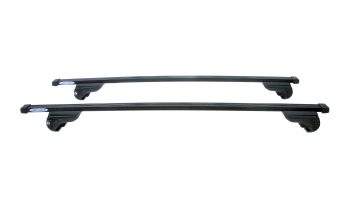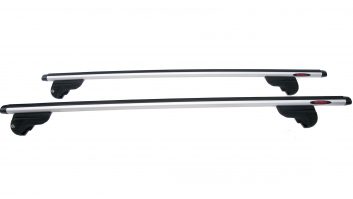Verdict
The Atera Signo roof bars are strong, well-made and reasonably priced – it is just a shame that they’re so fiddly to fit.
Pros
They support up to 100kg
A three-year warranty is included
Cons
They are quite awkward to fit
Loading up for caravan holidays is an art we all have to learn – it’s hard to pack light when you’re not sure what the weather may bring, and there’s always something that doesn’t quite fit in. So it’s no wonder that many caravanners like to fit a roof box or a bike rack to their tow cars. Either way, if you want to transport some of your camping gear on the roof, you’ll need a pair of good roof bars.
We’ve tested 10 roof bar sets, to discover which might be the best for caravan holidays. We mounted all the roof bars onto the rails of our trusty tow car, the Volvo V70/850 Estate.
We reviewed the Whispbar S16w at £85.95, the Cruz SR+130 costing £49.95, the Summit 500 Series at £89.95, the Mont Blanc Supra 04 costing £103.43, and the modular and versatile Thule WingBar at £150.50.
Read all the Practical Caravan roof bar reviews before you decide which set is the right one for you and your tow car!
So, what were we looking for during our roof bar testing process? We compared the different shapes to see how well they could reduce wind noise and drag, thereby improving fuel efficiency, compared to traditional square-section bars.
We checked out the different maximum loads that each roof bar set could handle. We know that it’s important to avoid overloading the tow car, so we made sure we wouldn’t exceed the lower of the vehicle’s maximum roof load weights – including the weight of the bars themselves – or the bars’ maximum.
Next we considered how easy it was to fit the roof bars. We discovered that vehicle-specific roof bars tend to be easier to fit than modular systems. On the other hand modular systems are far more versatile, and you’ll be able to use them on other cars you might buy in the future.
We have tested rail-fit bars for these reviews, and have also checked out how the same bar fares when fitted with mounts designed to be secured to door apertures.
The latter are more fiddly to install, because they work as a whole. When you tighten the foot and clamp into one door aperture, it pulls against the foot and clamp on the other side of the vehicle. If one adjustment brings a foot too far over the roof’s edge, loosening that foot and pushing it slightly further down you’ll end up readjusting the other end. Ideally you need someone at either side to fit these bars.
Security is another aspect that we’ve considered during our roof bar tests. Some roof bars come with locks, while others have T-tracks – slim grooves – in the roof bars, into which you can fit special bolts to secure your extra gear. Unlike U-bolts, T-track bolts don’t have to be kept pressed against the bottom of the bar while being pressed from above.
In this review we’ll focus on the Atera Signo roof bars, which cost £84.95.
They are the cheapest bars here to support up to 100kg, and that maximum weight is made all the more usable by the bars’ modest combined weight.
The bars are beautifully made and backed up by a three year-warranty, but they’re not the easiest to fit initially. The adjustment bolt only moves each foot’s outer jaw. A separate pinch bolt – only accessible when the bars are off the vehicle – locks each foot laterally along the bar. Essentially you position the feet so that the inner jaws are right against the roof rails, remove the bar, lock the feet in place, refit the bar, then tighten the outer jaws to fully secure the feet against the rails. Subsequent fits are obviously faster and easier.
The bars are beautifully made and backed up by a three year-warranty
Technical Specifications
| Weight | 12kg per pair |
| Warranty | 3 years |
